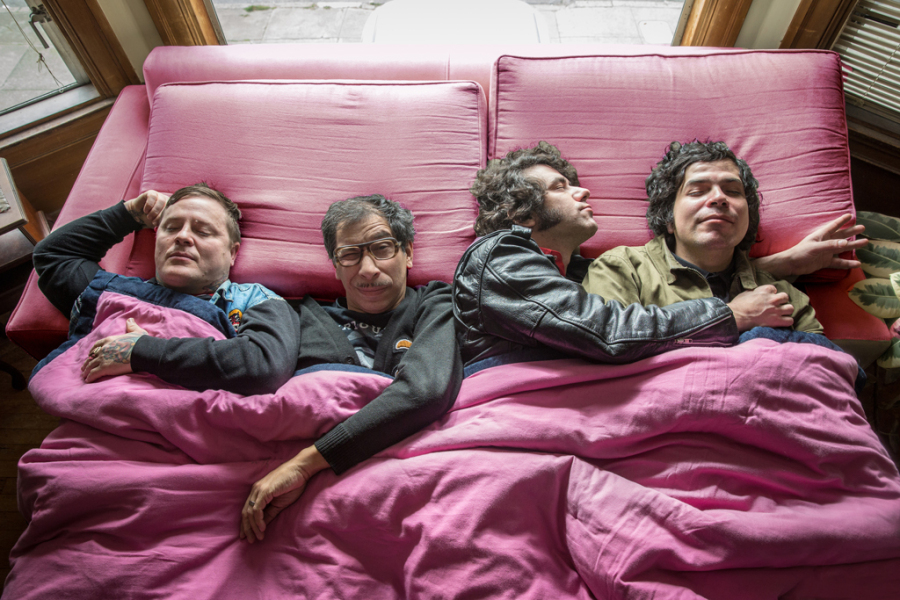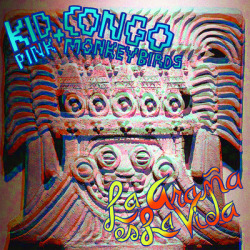Kid Congo Powers came to D.C. a decade ago as a fully formed underground rock ‘n’ roll hero, so it’s probably naïve to assume that the city would have any concrete effect on his sound.
Powers simplifies it even further: “I exist in my own brain,” he says on the phone from Connecticut, where he moved with his husband, who took a job at a museum there after 10 years in D.C.
What the 57-year-old Powers means is that although he soaked up a lot of D.C. perspectives — the primacy of politics, the strong altruistic streak of local punks, the “whisper of the South” in the culture — his mental space is inextricably connected to his past, which includes three legendary bands: The Gun Club, The Cramps and Nick Cave and the Bad Seeds.
So La Araña Es La Vida, the latest album by his band, Kid Congo & The Pink Monkey Birds, is a logical extension of its predecessors: Bluesy punk, psych-rock shimmy, weirdo lyrics and ambiguously sexy energy are all in full effect. (Listen to album cut “La Araña,” above.) But there’s a lot more oomph, too, and Powers does trace some of that to a D.C. source: Mark Cisneros, a fixture on the city’s punk scene. He took over as guitarist after the amicable departure of Jesse Roberts about three years ago.
“It’s good to have someone who wasn’t in your band for so many years to come in, because then he had great ideas about what our strengths were, that we can’t see,” Powers says.
One crucial connection point: Both grew up as Chicano kids in Los Angeles, but in different eras. Powers, as a Mexican-American pioneer in L.A.’s late-’70s/early-’80s scene, was an obvious touchstone years later for a young Cisneros, now 42.
“I got into listening to punk rock when I was like, in junior high, and most of the bands were all white guys. So to find out that Kid Congo was a Chicano and he was in The Cramps and The Gun Club, it was just like, ‘Wow!'” says Cisneros, who still lives in D.C. “It’s one of those things where you gotta see it to be it. That was just so huge for me.”
After they connected in D.C., they shared an appreciation of ’60s Chicano soul music. “To bring more of that into the Monkey Birds, it’s where my heart is,” says Cisneros, who has played in Deathfix and Medications, among other D.C. bands. Texas-based bassist Kiki Solis, who’s half-Mexican, and drummer Ron Miller — who co-founded the Harveyville Project in Kansas, where the album was recorded — round out the group.
“We are trying to guard music from being horrible.” —Kid Congo Powers
Of course, any identifiable Chicano threads on La Araña Es La Vida come from oblique angles. Most of the vocals on “Chicano Studies” are actually field audio of a dunk-tank clown. Powers sees the culture’s influence on him as partly as “a sense of outsiderness” combined with “Catholic damage.”
“Even for me, I remember in my grandmother’s living room, where my parents and the whole family — my aunts and uncles, cousins, everybody — they would have wild, drunken, crazy parties, but it was always overseen by this anguished Jesus. A giant, framed print of this anguished Jesus with the crown of thorns, tears, you know, the whole bit — that just stuck in my mind [like], ‘Wow, this is totally nuts,'” Powers says. “I knew that as a kid. I didn’t fear it, I was just fascinated by it.”
Spider man
The album title is a firmly Mexican reference: the Great Goddess of Teoticuhan, a spidery character who some say sprouts hallucinogenic morning glories from her head as part of her defense of the underworld.
“I thought, ‘that’s very much what we do.’ You know, we make these dreams, and we are trying to guard music from being horrible,” Powers says, adding that part of his job is to protect the honor of his previous bands.
“She’s just a very groovy character,” Powers says. “Hallucinations and guarding the underworld … what else is there in life?”
For him, the roots of psychedelia remain strong, even though decades of pop-culture rehashing have made such references commonplace in the public imagination.
“It’s not routine, it’s absolutely sincere, I have no sense of irony about it. All these things I talk about — the clown dunking and the hallucinogenic spider goddess — to me, that’s all stuff that is absolutely beautiful. And it seems that I’ve always looked at things in an askew sort of way, but I’m looking for beauty and hope and love and all these things, and I actually see it, in these images,” he says. “And I see hope in making music that is going to — I don’t want to say enlighten — enliven people. … I want the world to be on fire and lit up, and I want [the music] to be likable, but not what you think you like.”
Cisneros says he can understand why so many other great bands were receptive to Powers’ presence. He got a concentrated dose at Harveyville, where the band recorded La Araña Es La Vida in 2014.
“He’s so laid back, he’s open for every single idea, and he’s not one to put the brakes on anything. … If he gets to a point where he kind of disagrees with it, if it’s not getting his approval, then he just has the most sweet, charming way of convincing you that it’s not the right thing to do. He does it in this way that he makes everybody feel that it’s their idea and they were the one who made that call,” Cisneros says, chuckling. “He’s really … I think he’s just made mostly of magic.”
Kid Congo & the Pink Monkey Birds perform May 12 at Comet Ping Pong. La Araña Es La Vida is out April 22 on In the Red Records.



